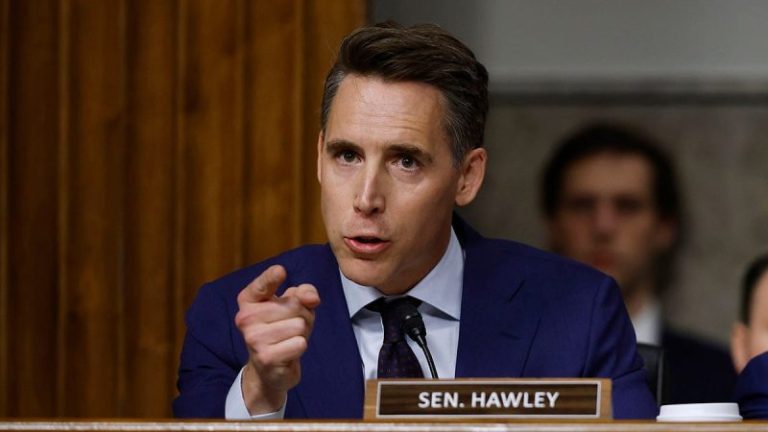It was a made-for-TV moment: The two leaders met on the tarmac at Joint Base Elmendorf–Richardson in Anchorage, Alaska, Air Force One and two F-35 fighters in the background. As they walked together, overhead came the roar of those F-35s, followed by the low, almost ghostly sweep of a B-2 stealth bomber — a display of U.S. airpower as much as a nod to the Cold War history between the nations.
Hours later, after their closed-door discussions, President Donald Trump and Russian President Vladimir Putin appeared again — this time on a raised stage, each behind a podium, U.S. and Russian flags flanking both sides, with a blue backdrop behind them that read ‘Pursuing Peace.’ It was the first U.S.-hosted summit between American and Russian presidents on U.S. military soil.
Trump had spent days rehearsing via secure calls with European leaders and Ukrainian President Volodymyr Zelenskyy, coordinating ‘red lines’ to take into the meeting: no territorial concessions to Russia, Ukraine in the room for all negotiations, and clear conditions for any sanctions relief. Yet, despite the military pomp and the careful stagecraft, what emerged from Alaska was not a deal, but a diplomatic pause — warm words, thin details, and the hard work still ahead.
Putin spoke first, describing the talks as ‘constructive and mutual respect.’ He recalled moments in history when the U.S. and Russia ‘worked together’ and said he sought a ‘long-term settlement.’ He acknowledged Russia’s ‘legitimate concerns’ and said it was ‘very important for our countries to turn the page.’ He described a ‘trustworthy tone’ in the conversation and praised Trump for having ‘a good idea of what he wants.’ In a line clearly aimed at the cameras back home, Putin claimed Trump told him that if he had been president earlier, ‘there would not have been war,’ and confirmed that he believed it was true.
Trump followed, also taking no questions. ‘We had productive meetings,’ he said. ‘Big agreements. No deal until there is a deal.’ He promised to call ‘NATO,’ to ‘call Zelenskyy,’ and declared, ‘We really made great progress today.’ He reminded the audience of his ‘fantastic relationship with Putin’ and judged there was ‘a good chance of getting there,’ even if ‘we’re not there yet.’ Most importantly, Trump said, ‘We need to stop thousands of people being killed every week.’
For all the positive tone, the substance was modest. Putin left Alaska dangling the prospect of a ceasefire — but with strings attached. We know from prior statements that he wants the U.S. to lift certain sanctions and drop tariff threats aimed at countries like India that buy Russian energy. He intends to keep control of two eastern Ukrainian provinces seized in 2022. Likely, Trump did not concede those points, but evidently they agreed to a follow-on meeting ‘soon.’
While the flags fluttered in Anchorage, the war did not stop. Russian forces pressed forward modestly near Dobropillia in Donetsk region, testing Ukrainian defenses in what looks like an attempt to improve their tactical position before any pause. Ukraine rushed reinforcements, stabilizing the line for now, but fighting remains intense.
Russia’s long-range bombardment shows no sign of abating. In July alone, Moscow launched more than 70 cruise missiles and thousands of Iranian-made Shahed drones at Ukrainian targets. Ukraine has answered with deep strikes — including a hit on a Russian oil refinery and the bombing of a cargo ship carrying drone parts in the Caspian Sea. Neither side is behaving as if the war’s end is imminent.
That’s why any ceasefire talk must be backed by ironclad verification: neutral observers on the ground, satellite surveillance, clearly mapped lines, and automatic ‘snap-back’ sanctions for violations. Without that, Moscow will have every incentive to rearm under the cover of diplomacy.
If nothing else, Alaska revealed the bottom lines.
For Putin, it’s about locking in territorial gains and relieving the economic pressure eroding his war machine. Rolling back sanctions on countries that help him skirt restrictions would boost his revenues and signal to others that U.S. economic warfare is negotiable.
For Trump, it’s about testing whether Putin can be moved toward de-escalation without sacrificing U.S. credibility. Involving Zelenskyy keeps Ukraine’s fate from being decided in absentia, and reaffirming NATO’s support reassures allies.
For Ukraine, it’s a double-edged sword. A follow-on meeting offers a diplomatic opening, but Putin’s explicit territorial demands remain a political, legal, and moral red line.
Washington must resist trading sanctions relief for vague promises. The sanctions regime is one of the few levers that works, and any easing must be tied to measurable, sustained compliance verified by independent intelligence as well as neutral monitors.
Putin leaves Alaska with the optics of being a willing negotiator — useful for his domestic image — but no immediate relief on sanctions or Western recognition of his land grabs. Expect him to probe Western unity with limited escalations in the next two weeks.
Kyiv has a brief window to reinforce its defenses and prepare a clear case for the next meeting: explicit security guarantees, timetables for arms deliveries, and a non-negotiable stance on sovereignty.
Allied capitals can point to a small win: the U.S. did not cut a side deal. But they must be ready to step up enforcement and fill any gaps if U.S. resolve wavers.
Beijing will study Alaska closely. If the West blinks on sanctions enforcement, it could embolden Chinese adventurism in the Pacific. A unified Western stand would send the opposite message.
If the U.S. wants these ceasefire talks to go anywhere, three steps are essential:
- Lock in Enforcement MechanismsBuild a monitoring framework that combines neutral observers, allied intelligence, and technological oversight. Make violations costly and automatic to deter cheating.
- Keep Ukraine at the Center‘No decision about Ukraine without Ukraine’ must remain non-negotiable. Zelensky needs a real voice and veto over any territorial terms.
- Use Sanctions as Leverage, Not CurrencyAny relief should be phased, conditional, and reversible. Sanctions should be the reward for sustained compliance, not an upfront concession.
The Alaska summit was not the breakthrough some hoped for, but it wasn’t a failure, either. It gave both sides a clearer picture of the negotiating terrain and bought time for positioning. But time favors the side that uses it best.
For the United States, that means holding firm on sanctions, bolstering Ukraine’s defenses, and treating any ceasefire as the start of a rigorous verification process, not the war’s conclusion. For Ukraine, it means preparing for two divergent paths: meaningful diplomacy or intensified conflict. For Russia, it means deciding whether continued war is worth the mounting cost when the West refuses to pay in land.
If Alaska was merely a pause, the next meeting will decide whether it becomes a bridge to peace — or a bridge to nowhere.
This post appeared first on FOX NEWS










